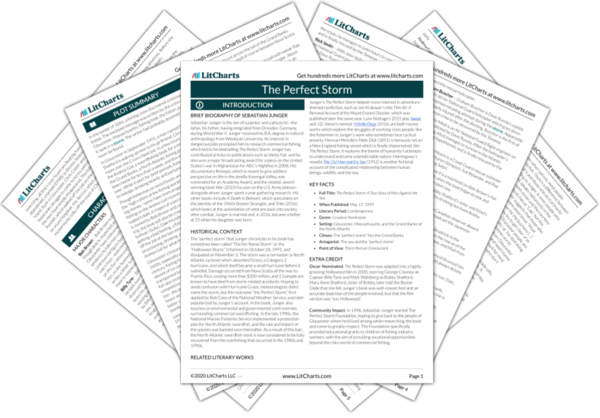Albert Johnston Quotes in The Perfect Storm
More people are killed on fishing boats, per capita, than in any other job in the United States. Johnston would be better off parachuting into forest fires or working as a cop in New York City than longlining off the Flemish Cap. Johnston knows many fishermen who have died and more than he can count who have come horribly close. It’s there waiting for you in the middle of a storm or on the most cloudless summer day. Boom—the crew’s looking the other way, the hook's got you, and suddenly you're down at the depth where swordfish feed.

Unlock explanations and citation info for this and every other The Perfect Storm quote.
Plus so much more...
Get LitCharts A+In a sense Billy’s no longer at the helm, the conditions are, and all he can do is react. If danger can be seen in terms of a narrowing range of choices, Billy Tyne’s choices have just racheted down a notch. A week ago he could have headed in early. A day ago he could have run north like Johnston. An hour ago he could have radioed to see if there were any other vessels around. Now the electrical noise has made the VHF practically useless, and the single sideband only works for long range. These aren’t mistakes so much as an inability to see into the future. No one, not even the Weather Service, knows for sure what a storm's going to do.
The crew just racks out and watches videos. Everybody acknowledged this was the worst storm they'd ever been in—you can tell by the size of the waves, the motion of the boat, the noise, the crashing. There’s always a point when you realize that you're in the middle of the ocean and if anything goes wrong, that’s it. You see so much bad weather that you kind of get used to it. But then you see really bad weather. And that, you never get used to.

Albert Johnston Quotes in The Perfect Storm
More people are killed on fishing boats, per capita, than in any other job in the United States. Johnston would be better off parachuting into forest fires or working as a cop in New York City than longlining off the Flemish Cap. Johnston knows many fishermen who have died and more than he can count who have come horribly close. It’s there waiting for you in the middle of a storm or on the most cloudless summer day. Boom—the crew’s looking the other way, the hook's got you, and suddenly you're down at the depth where swordfish feed.

Unlock explanations and citation info for this and every other The Perfect Storm quote.
Plus so much more...
Get LitCharts A+In a sense Billy’s no longer at the helm, the conditions are, and all he can do is react. If danger can be seen in terms of a narrowing range of choices, Billy Tyne’s choices have just racheted down a notch. A week ago he could have headed in early. A day ago he could have run north like Johnston. An hour ago he could have radioed to see if there were any other vessels around. Now the electrical noise has made the VHF practically useless, and the single sideband only works for long range. These aren’t mistakes so much as an inability to see into the future. No one, not even the Weather Service, knows for sure what a storm's going to do.
The crew just racks out and watches videos. Everybody acknowledged this was the worst storm they'd ever been in—you can tell by the size of the waves, the motion of the boat, the noise, the crashing. There’s always a point when you realize that you're in the middle of the ocean and if anything goes wrong, that’s it. You see so much bad weather that you kind of get used to it. But then you see really bad weather. And that, you never get used to.











